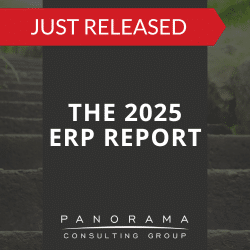ERP systems with supply chain management functionality integrate procurement, inventory, production, and distribution processes into a single system.
By analyzing real-time data from supply chain operations, these systems help identify inefficiencies, forecast future demand, and suggest areas for improvement. This enables companies to make more informed decisions and strategically plan for future growth.
Read on to learn more about the role of ERP in supply chain management.
The Role of ERP in Supply Chain Management
External factors, like globalization and technological advancements, have transformed supply chains from linear sequences into dynamic, interconnected systems. Today, the product life cycle is a mosaic of processes stretching across continents and cultures.
An ERP system’s role in navigating this complexity is providing an in-depth view of every touchpoint, while coordinating and optimizing these processes to reduce costs and enhance agility.
Unlike standalone supply chain management systems, comprehensive ERP systems encompass back office functions in addition to supply chain functions. This includes finance, human resources, and more.
Following are some of the most important supply chain processes to prioritize when selecting ERP software.
1. Demand Planning and Forecasting
This function helps companies align supply with demand to optimize inventory management.
Many of the top ERP systems now incorporate machine learning algorithms and predictive analytics to enhance demand forecasting accuracy. In turn, businesses can respond proactively to market trends and consumer behaviors.
In the healthcare sector, for example, AI-driven demand forecasting can help pharmaceutical companies anticipate demand for essential medications, vaccines, and healthcare products. By analyzing data, such as historical sales trends and epidemiological data, AI-powered ERP systems can predict demand changes, such as the need for chronic disease medications.
This proactive approach allows pharmaceutical companies to adjust their production schedules, manage inventory levels, and collaborate with healthcare providers and distributors.
(Learn about AI in the pharmaceutical industry.)
2. Procurement
An ERP system should empower companies to easily manage procurement processes by providing real-time visibility into warehouse operations, transportation logistics, and more.
Modern ERP systems are increasingly integrating blockchain technology to streamline procurement processes even further. Blockchain can verify the authenticity of goods, track their origin, and secure transactions, reducing fraud and errors.
This technology also facilitates better vendor management and contract compliance, ensuring that procurement processes are more reliable and efficient.
Software Selection & Process Improvement Case Study
In helping the client get its project back on track, one of our primary focus areas was decreasing their customization needs by improving their processes to align with the system's best practices.
3. Production and Distribution
By providing a detailed overview of production requirements, ERP systems enable managers to track material and labor in real-time.
ERP systems that integrate with IoT technology offer even more detailed insights into production and distribution processes. IoT devices can provide continuous updates on the status of machinery, the efficiency of production lines, and the condition of goods.
Our ERP software consultants frequently help clients develop an information strategy so they can prepare their data for new technology. This means ensuring strategic alignment regarding production and distribution goals and determining what data insights are necessary to achieve those goals. Then, we help the company develop a data migration strategy for cleansing and integrating their data so the software can provide reliable insights.
4. Shipping
An ERP system should centralize all details pertaining to customer shipments and product deliveries.
Recent advancements have led to the use of AI and advanced analytics in optimizing shipping logistics. These technologies can predict the best routes, reduce shipping costs, and improve delivery times.
Additionally, AI can help select the most appropriate packaging methods for different products, considering factors like cost, environmental impact, and product safety.
The Benefits of Integrating ERP and SCM
If a business already has a supply chain management (SCM) system, why should it invest in an ERP system?
Here’s why:
1. Increased Resilience
ERP systems can dynamically reallocate resources and adjust production schedules. This ensures continuous operations despite unforeseen challenges.
For example, a manufacturing firm might use ERP and SCM integration to forecast potential supply chain disruptions. If the data points to a potential shortage in raw materials, the company can adjust procurement strategies and production schedules accordingly.
2. Enhanced Transparency and Trust
By streamlining interactions with suppliers through blockchain and other secure technologies, ERP systems not only ensure efficiency but build trust.
It all starts with transparency. Every stakeholder in a blockchain-enabled supply chain has access to accurate and unalterable transaction records. This builds confidence among partners and customers alike.
3. More Opportunity for Innovation
With ERP and SCM system integration, companies can identify untapped market segments or customer needs that align with their capabilities. Then, they can develop innovative products or services tailored to these new opportunities.
For instance, a food and beverage company might use ERP advanced analytics to analyze consumer purchasing behaviors alongside agricultural supply chain data. As a result, the company might identify a significant rise in demand for organic, non-GMO foods. It could then begin to source from certified organic suppliers and adapt its manufacturing processes to preserve the integrity of organic ingredients.
Learn More About ERP and Supply Chain Integration
Whether you’re looking for an ERP system to integrate with your SCM system or seeking an all-in-one ERP solution, the selection process will be challenging. If you want in-depth advice on how to evaluate supply chain technology, we can walk you through considerations like scalability, ease of integration, and more.
Request a free consultation with our ERP consultants.













